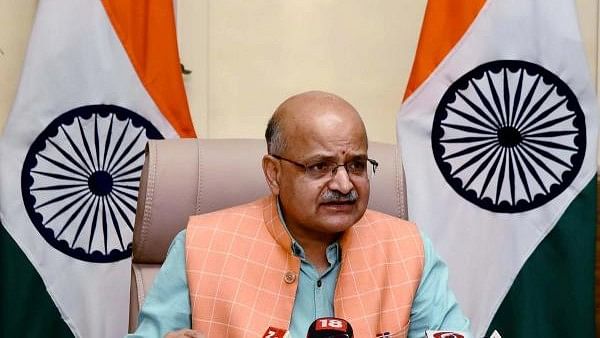
NITI Aayog CEO BVR Subrahmanyam.
Credit: PTI Photo
New Delhi, Nov 7 (PTI) India should be a part of the Regional Comprehensive Economic Partnership and Comprehensive and Progressive Agreement for Trans-Pacific Partnership, Niti Aayog CEO BVR Subrahmanyam said on Thursday.
India pulled out of the RCEP in 2019 after entering negotiations in 2013. The RCEP bloc comprises 10 ASEAN group members (Brunei, Cambodia, Indonesia, Malaysia, Myanmar, Singapore, Thailand, the Philippines, Laos and Vietnam) and their six FTA partners - China, Japan, South Korea, Australia and New Zealand.
"India is one of few countries which are not a part of large trade agreements. India should be a part of RCEP (Regional Comprehensive Economic Partnership) and CPTPP (Comprehensive and Progressive Agreement for Trans-Pacific Partnership) and become a member," Subrahmanyam said at an event organised by industry body Assocham.
"...that will be best for India's Micro, Small & Medium Enterprises (MSME) sector. The 40 per cent of India's exports are from MSME. Big corporates are not great exporters," he added.
CPTPP is a free trade bloc spanning five continents, made up of Pacific rim countries of Canada, Mexico, Peru, Chile, New Zealand, Australia, Brunei, Singapore, Malaysia, Vietnam and Japan.
"I don't think we have captured the 'China plus one' opportunity as much as we could have," he said, adding that countries like Vietnam, Indonesia, Malaysia, Turkey, and Mexico have probably benefited more from 'China plus one' than India.
Subrahmanyam emphasised that India will have to get into the global value supply chain as 70 per cent of the world's trade happens through the global supply chain.
Pointing out that India's tariffs are higher compared to other countries, he said, "We have 2-3 major bottlenecks, we have tariffs, which are higher. I think if we don't cut tariffs, then we are not going to be benefited because that is the pain point".
The CEO admitted that investment by the private sector is not happening at the pace 'we would like to'.
"The private sector is here to make profit..capacity utilisation (in the private sector) is still running around 70 per cent," he added.
Subrahmanyam said India is one of the shining stars on the global horizon, policy consistency and reforms that have led to a spectacular growth path.
"We ended last fiscal year at about 8.2 per cent growth rate and are poised to be the third largest economy by 2027.
"Today, our contribution to incremental global growth is about 20 per cent, which will only increase," he said.